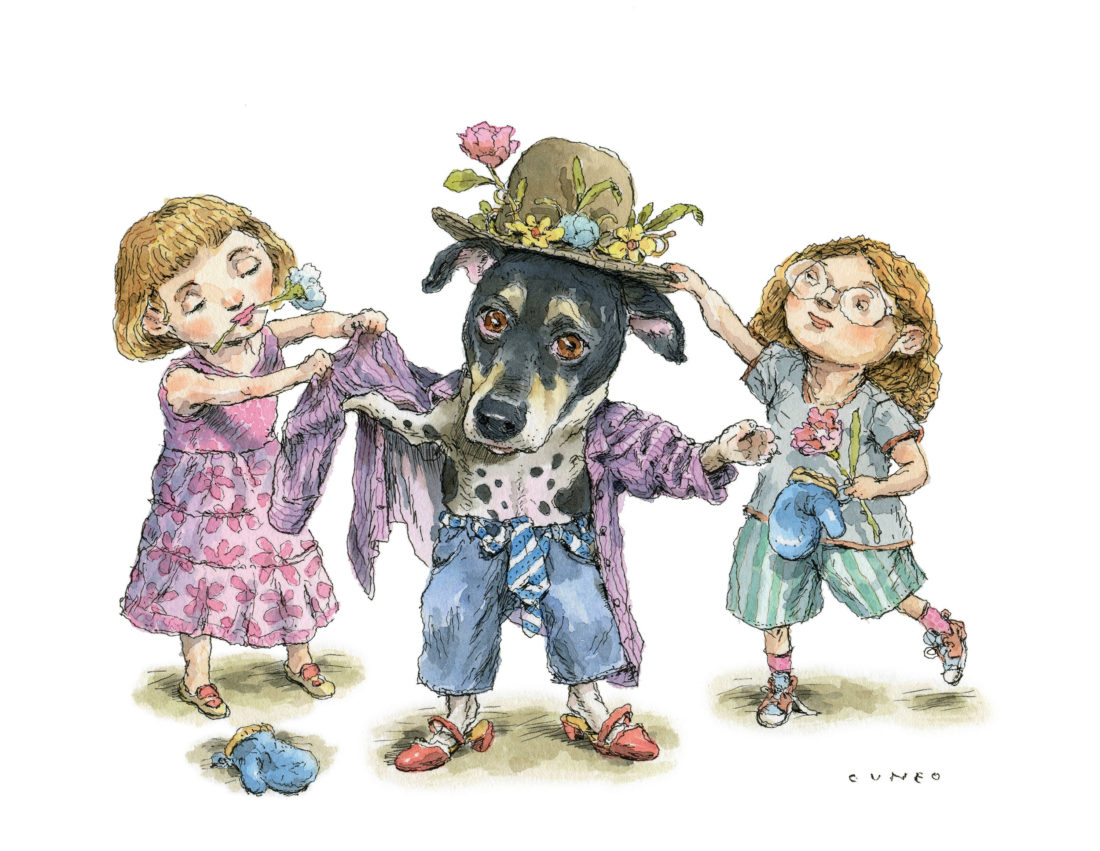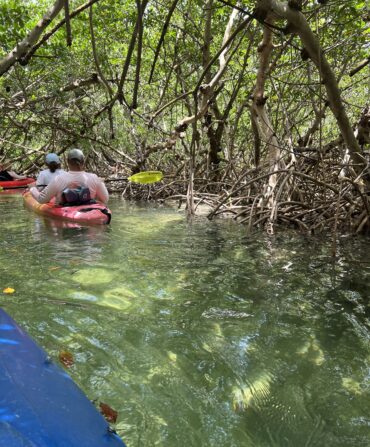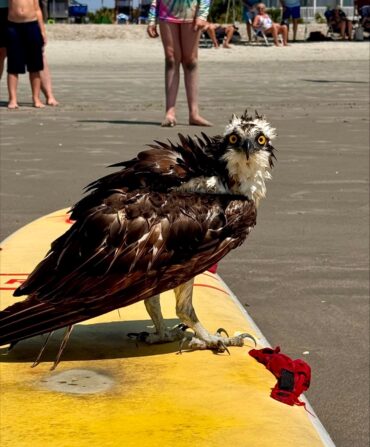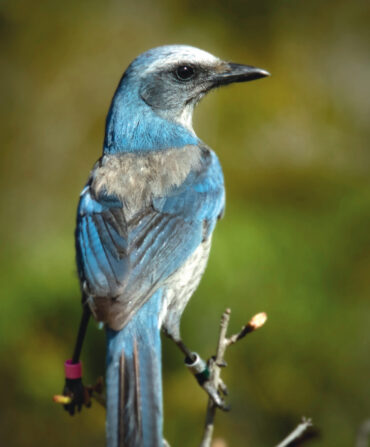My eldest daughter, Cheyenne, was almost four, and I wanted her to have a dog. I had always had one as a child, and I wasn’t about to let her grow up without that same comfort. My youngest, Liv, was barely a year old. So the three of us drove through the Kentucky hills to a community aptly called Greenmount, where my cousin had told us an old
man was eager to give away some puppies.
Crooked old Rufus grimaced and grunted with each step as he shuffled across the blue gravel of the driveway to show us the dog pen. The mother didn’t even glance up, exhausted by the six pups swarming at her swollen teats. The smallest one was worming his way to supper but kept getting knocked back by his siblings.
“Are they not weaned, then?” I asked.
“Oh yeah, they’re plumb weaned, just greedy.”
The runt had given up on feeding and was standing on his back legs with his front paws on the chain-link fence, showing off his fat pink belly, decorated with gray spots.
“I’ve done took care of their tails,” Rufus informed us, and nodded to the stubs wagging at the end of each dog’s rump. Old country men like him still believed that cutting off a dog’s tail not only made it more attractive but also kept the dog from roaming too much. He had most likely done the deed with a hatchet and an old chopping block.
Cheyenne picked the runt and insisted we name him Rufus after the creaky old man. She held the infant Rufus, baby-talking to his small pink nose as our car made its way along the winding road of the green valley.
Rufus grew fast. His nose became a wet, leathery black. He held his noble head high, and his docked tail hardly ever stopped wagging. Most likely he was part beagle and part pit bull. Maybe some mountain feist, too. We didn’t care what he was; country folks love a mutt more than anything else. His chest was wide and strong. His legs long and fast. His ears silky and irresistible. But the best thing about Rufus was his large brown eyes. Eyes that communicated everything he needed us to know, mostly that he worshipped us.
We lived on several acres at the mouth of a holler. In that world, Rufus was able to roam far and wide. He loved nothing more than zooming through the woods and pastures. To see him run was a thing of rare beauty: pure freedom and unadulterated joy. He was an athlete. My parents lived just over the ridge. Often we walked there through the pinewoods, and Rufus tore into brambles and brush to make his own path. He waited for us at my parents’ front door, proud to have beaten us there despite being covered in cockleburs and bloodied by thorns.
He was a tough ole dog, made for country living. For a time he tried to please us by bringing home the back end of a rotten possum or the front end of a groundhog. He stopped when he saw that wasn’t the way to adulation. Once he arrived with a rump full of birdshot after putting his nose in the wrong person’s garden. Another time he limped home with his front right paw nearly cut in two. Most likely he had gotten it caught in a barbed-wire fence, probably while chasing a rabbit. I had him sewn up good at the vet’s office, and he endured an impatient week of recuperation. Once healed, he was back to his morning rounds: down to the creek, a sprint through the woods, over the ridge to say hello to my parents, a stop by a couple of dog friends for some butt sniffing and good-natured banter. The only time he lowered himself to enter a house was when we forced him in on cold nights. He needed the land to ramble, to break out in a rhythmic canter.
Yet Rufus knew how to be still, too. There were so many evenings he sat atop the ridge with me, watching the gloaming ease into the valley, his head resting on my thigh. If I stopped petting him, he would nudge his warm muzzle against my hand to get me going again. In those days I knew my marriage was ending, and my greatest comfort was when he sat with me and my hollowed-out grief. He snuggled in as closely as possible while I wrote or read, often falling asleep and breathing in his steady way. And he would be still as long as my daughters demanded while they buried him in their sandbox, dressed him up in their old clothes, or read him picture books.
Ten years after we took Rufus home, he was an old man. He moved a little more stiffly then, but he was still spry. He could still thrill me by taking off in a gallop. Around this time my inevitable divorce happened, and I had to leave our sweet little house tucked into the side of Slate Ridge. When I moved an hour away for a new job at Berea College, I was going to a whole new world: a little college town that was in many ways the opposite of the wooded ridges and hollers where I had lived my whole life. I knew I couldn’t take him with me, because my children needed him. And he needed the country for his roamings. Country dogs are like country people: They don’t fare too well in town.
As a divorced father, I was lucky to have my children with me often, but when they were staying with their mother, Rufus would curl up on the front porch so he could be at their beck and call. Each time they visited their grandparents, he made his jaunty way over the ridge and situated himself on their doorstep in case his services were needed.
I knew, even then, that he was standing in for me. I grieved over not living full-time with my own kids, but it was always reassuring to find him there when I went back to my old house to fetch them. Sometimes I sat down on the ground and took him into my arms. I wanted him to know how thankful I was to him for being there, for protecting them.
Then they grew up, too.
As soon as they were both away at college, Rufus fell into quick decline. By then he had relocated to my parents’ house. They were getting older, and now that the children were gone he had to take care of someone, so he chose them. He became like them, too, spending most of his time on the porch or walking the rows of the garden, where my parents still raised bushels of tomatoes and green beans, cabbages as big as small watermelons. I drove down to see all three of them as much as I could. Often I found Rufus at my father’s heels as they piddled around in the toolshed. Sometimes he kept watch as my mother swept the porch or canned kraut. He was nigh on sixteen years old when my mother called the first time, sure he was about to die. He could no longer get up without struggling, and he had a deep, hacking cough. The vet said it was just old age. “He doesn’t seem to be suffering yet, though,” we were assured. But he didn’t last long after that.
My children and I went to be with him when he was dying. We lay on the floor of the porch with him and let his breath play out across our faces, his brown eyes looking from one of us to the other as he told us goodbye. He had done his job. He had comforted me in my times of sadness. He had looked after these children. He had ushered my parents into their golden years with dignity. I had so many regrets, watching him fade away. I should have spent more time with him. I should have done this, or that. That’s how grief first begins gnawing at us. Now it was time to go, and although he seemed ready, we were not.
My father, a man who did not easily show emotion, wept as he dug the grave. He carved RUFUS into a large stone and positioned it there, in their backyard. My mother can see it from the kitchen window while she washes dishes. “He took care of every one of us,” she told me shortly after he died, undone in sorrow.
Maybe it’s arrogant to assume a dog would devote his whole life to watching over me and my family. Maybe it’s the height of self-importance to assume another creature has lived for you. But that’s the way good dogs are. Always there, always knowing exactly what to do to make you feel better. Sometimes that means running and sometimes that means being still. Rufus always knew which offered the most beauty at the right time.








